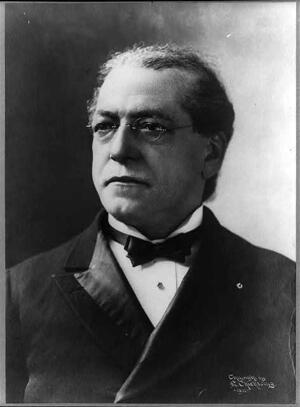Samuel Gompers
This image is available from the United States Library of Congress' Prints and Photographs division under the digital ID cph.3a21088
Samuel Gompers was born in 1850 to a Jewish family in London, the oldest of five sons. At age 10, Gompers left school for the workforce, first apprenticing as a shoemaker and then joining his father as a cigar maker. In 1863, the Gompers family immigrated to New York City, where Gompers continued as a cigar roller, first at home in their Lower East Side tenement, and then in a local shop. In 1864, he joined the Cigar Makers' International Union (CMIU). Gompers was married by age 17 to Sophia Julian, with whom he would have 12 children.
Through his job and his union involvement, Gompers learned from older immigrants about the role of unions and labor reform. He quickly became a union leader and spokesman, and in 1875 he was elected president of Local 144 of the CMIU. By 1886, he was a vice-president of the international union and had been involved in founding the Federation of Organized Trades and Labor Unions (FOTLU). When the FOTLU became the American Federation of Labor in 1886, Gompers was elected its first president, a position he held for the rest of his life except for a one year sabbatical in 1895. Under his leadership, the AFL grew into the largest labor federation in the world, from 50,000 members in 1886 to nearly 3 million in 1924.
Gompers believed in craft or trade unions, which restricted membership to skilled wage earners and organized workers according to their craft. This approach brought him into conflict with the Knights of Labor (the previous leading labor organization) and later with industrial unionists such as the International Workers of the World (IWW) and the Committee for Industrial Organizations (CIO), which ultimately split from the AFL in 1938, re-merging in 1955 to form the AFL-CIO.
Gompers also advocated "pure and simple" trade unionism: a focus on harnessing workers' economic power rather than political power. When political action was necessary, he believed labor should have an independent, nonpartisan political agenda. His own political influence grew during the presidency of Woodrow Wilson. During WWI, Gompers served on the Council of National Defense, helping to mobilize the wartime workforce and to develop pro-labor policies in the government. At the end of the war, Wilson appointed Gompers to the Commission on International Labor Legislation at the Versailles Peace Conference, where Gompers helped found the International Labor Organization.
Gompers died in December 1924.
Sources:
AFL-CIO. "Key People in Labor History: Samuel Gompers." Accessed April 25, 2012. http://www.aflcio.org/About/Our-History/Key-People-in-Labor-History/Samuel-Gompers-1850-1924.
The Samuel Gompers Papers. "SG Bio." Accessed April 25, 2012. http://www.history.umd.edu/Gompers/bio.htm.
USHistory.com. "Samuel Gompers." Accessed April 25, 2012. http://www.u-s-history.com/pages/h1747.html.



